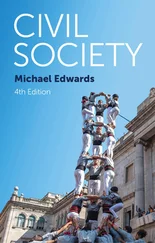Civl society
Здесь есть возможность читать онлайн «Civl society» — ознакомительный отрывок электронной книги совершенно бесплатно, а после прочтения отрывка купить полную версию. В некоторых случаях можно слушать аудио, скачать через торрент в формате fb2 и присутствует краткое содержание. Жанр: unrecognised, на английском языке. Описание произведения, (предисловие) а так же отзывы посетителей доступны на портале библиотеки ЛибКат.
- Название:Civl society
- Автор:
- Жанр:
- Год:неизвестен
- ISBN:нет данных
- Рейтинг книги:4 / 5. Голосов: 1
-
Избранное:Добавить в избранное
- Отзывы:
-
Ваша оценка:
- 80
- 1
- 2
- 3
- 4
- 5
Civl society: краткое содержание, описание и аннотация
Предлагаем к чтению аннотацию, описание, краткое содержание или предисловие (зависит от того, что написал сам автор книги «Civl society»). Если вы не нашли необходимую информацию о книге — напишите в комментариях, мы постараемся отыскать её.
dealing with the theory, history, and philosophical heritage of
the civil society, as well case studies from actual practice.
Civl society — читать онлайн ознакомительный отрывок
Ниже представлен текст книги, разбитый по страницам. Система сохранения места последней прочитанной страницы, позволяет с удобством читать онлайн бесплатно книгу «Civl society», без необходимости каждый раз заново искать на чём Вы остановились. Поставьте закладку, и сможете в любой момент перейти на страницу, на которой закончили чтение.
Интервал:
Закладка:
Anyone who aims at doing away with this order – for the sake of human dignity or liberty – must be fought against; and that not only going as far as to forbid his political organisation or the forfeiture of his basic rights, but going even further, and using armed force if necessary, as expressly approved in Article 20.4 of the German Constitution. On the other hand, a person whose aim is not to eliminate the liberal democratic basic order, but only do away with individual regulations or institutions of a liberal, democratic state is simply a dissident, or a radical at most, who has got on the wrong track. A person of this kind can only be approached with the normal means of political discussion.
In this context, in its ruling on the prohibition of the German Communist Party, the Federal Constitutional Court expressly stated that a party, and a political position in particular, “ is not unconstitutional if it rejects individual positions, or even entire institutions, of the Constitution. Rather it must reject the highest values of constitutional order, the fundamental constitutional principles, which make the constitutional order free and democratic, principles on which, at least, all parties must agree if this kind of democracy is to function meaningfully at all… [A party or political position is] also not unconstitutional if it does not recognise these highest principles of a free democratic basic order, rejects them or counters them with others. Rather, there must be an active, combative, aggressive attitude towards the existing order; it must deliberately impair the functioning of this order and, in the further course, wish to eliminate this order itself. This means that the liberal-democratic state does not act against parties with aims that are hostile to it of its own accord, but merely defends itself from attacks on its basic order. This legal construction of the elements of an offence rules out abuse of the provision in the service of zealous persecution of inconvenient opposition parties .”
The reasons a person or group has for fighting the liberal democratic basic order, or their political aims, are completely irrelevant for determining extremism if the criteria mentioned above are used. However, it serves to provide desirable information if, for example, right-wing or left-wing extremism, Islamist extremism, or “middle-class extremism” is spoken about. But the use of such a term can never take the place of investigating whether those labelled as extremists really plan to attack and eliminate the free basic order, which is recognisable by its clear criteria. By the way, when assessing the ethical and political worthlessness of opposition of this kind, the source of the motives for extremism is completely irrelevant: whether they come from the middle of society, from the upper or lower classes, from the left, or from the right, or from another edge of the political spectrum does not play a role. This is because extremism always attacks everything that makes a pluralistic democracy possible and so advantageous as an embodiment of political order.
5. Current trends threatening the civil society
It can unfortunately no longer be taken for granted that open public dispute is not only legally possible, but that it is also guaranteed that everyone can represent an opinion in every situation and without fear of being threatened with violence. As has happened so often throughout history, there are now rather strict regulations and restrictions governing political thought and speech. They are assured by creating taboos, censure by oneself or others, as well as the ostracism and condemnation of dissenters. Starting points for the use of political force can always be found along such enforced criteria of political correctness. Their forms begin inconspicuously but soon reach ugly levels of escalation. They are all the more frightening, seeing that political violence is often motivated by unquestionably good intentions.
A starting point for many manifestations of violence that endangers freedom is that one reacts to political positions that one does not like with a kind of “political arachnophobia”. Disgusted and – genuinely or supposedly – driven by fear, the troublemaker is attacked with words and whistles, or other means, although he is generally only aggravating and not really dangerous. Many are motivated to use this kind of behaviour because they feel that grim situations they are aware of from history are looming up on the horizon; that is why they are determined to “nip it in the bud”. This reaction unfolds particularly easily whenever a connection can be made between somebody with a different opinion and National Socialism. It is then usually the case that communication is ruled out and forms of exclusion practiced that, in turn, make use of some subtle – and some very crude – techniques of the use of force.
The techniques employed to ostracise dissidents begin with refusal to question one’s own mindset and not even wanting to attempt to comprehend those connections that are so important to the person with a different opinion. This kind of ostracism goes further when it is considered a sign of special competence to be able to “explain away” everything that has caused the dissident to take his political position. One can make fun of “obviously unfounded” fears or pass them off as being “merely a pretext” – and portray the “real reasons” in appropriately dark colours. It is possible to achieve even more if the opponent is deprived of important terms, or if their use in the public sphere has been prevented or made slightly scandalous by setting “limits to what can be said”. This is intended to show that the distinctions and evaluations that are important for those who think differently can only be put forward against directly expressed contradiction – showing that the opponent is wrong through his choice of words alone.
The next stage of ostracism is reached when it becomes possible to attach labels to the opponent that show that somebody is really a “bad person”. The best way to begin is by judging him to be a “notorious troublemaker” or “political diehard”. A “strategic context formation” of this kind is particularly effective in Germany if it is possible to describe somebody as a “right-wing populist”, “fascist”, or – really popular in recent times – as a “racist”. And, in case the person is not directly recognisable as being evil, speaking of the “extremism of the middle” that the person to be outcast personifies, usually helps. It can also be particularly practical if it is possible to portray the marginalised person as being the incarnation of type that is dangerous to the general public. In that case, the demand for exclusion is no longer specifically directed against a fellow human being, who might even be likeable under different circumstances, or his particular actions, but simply against evil and its embodiment in the enemy . This makes it possible to assert one’s own moral superiority that can no longer be refuted for all practical purposes.
It is highly plausible that anybody who has been branded as being a “latent Nazi” or “populist” will be deprived of any possibilities for public appearances. You cannot provide a platform for a right-wing radical or racist; he can therefore no longer participate in talk shows on an equal footing – and, naturally, also not on discussion podiums and rostrums. The result of this kind of process reaches perfection as soon as the dissident not only shows weakness that justify his exclusion, but also reacts to such pressure by accepting his role as an outsider and, full of defiance, proves himself to be increasingly wrong.
The ostracism can go even further. The aim is to bring the dissident before a “virtual court” – for example, to “finish him off” on a talk show and then post the relevant video clip on the internet. It might even be possible to pin an investigation by the public prosecutor on him; there must be something behind it! The goal has been reached when the person who is to be rejected is regarded as “not to be taken seriously”, when he is no longer seen as a “trustworthy expert” – and maybe not even an “acceptable fellow citizen”. And the exclusion reaches the desired conclusion when the opponent withdraws from the public sphere. In a dictatorship, he might be incarcerated, exiled, admitted to a psychiatric institution, or possibly even murdered.
Читать дальшеИнтервал:
Закладка:
Похожие книги на «Civl society»
Представляем Вашему вниманию похожие книги на «Civl society» списком для выбора. Мы отобрали схожую по названию и смыслу литературу в надежде предоставить читателям больше вариантов отыскать новые, интересные, ещё непрочитанные произведения.
Обсуждение, отзывы о книге «Civl society» и просто собственные мнения читателей. Оставьте ваши комментарии, напишите, что Вы думаете о произведении, его смысле или главных героях. Укажите что конкретно понравилось, а что нет, и почему Вы так считаете.












